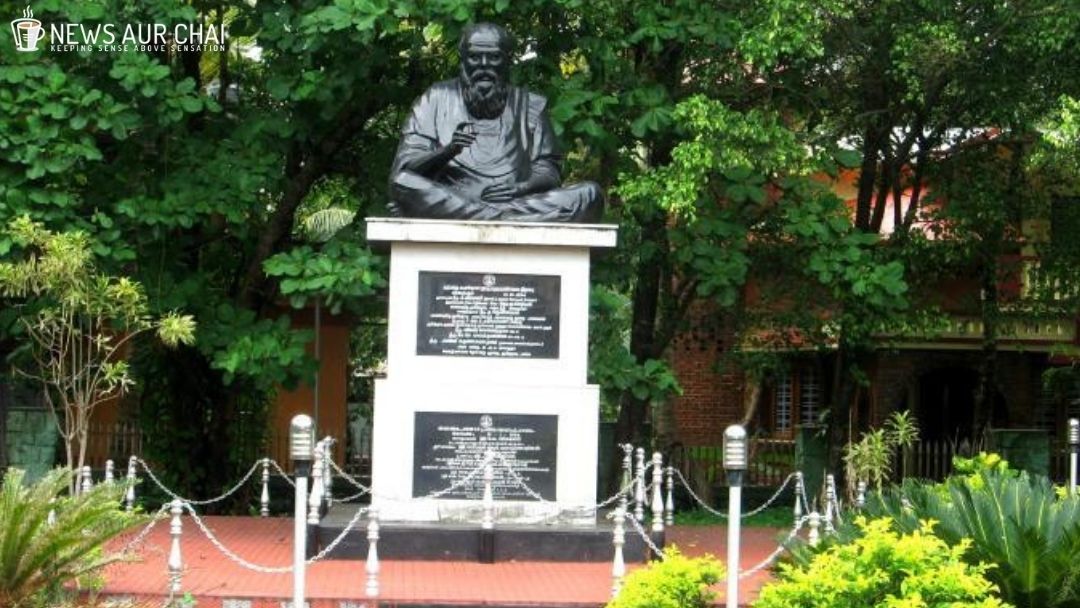
Erode Venkatappa Ramasamy or EV Ramasamy (17 September 1879 – 24 December 1973), who is known as ‘Periyar’, and commonly referred to as ‘Thanthai Periyar’, was a social activist and a politician of India by whom the Self-Respect Movement and Dravidar Kazhagam started.
EV Ramasamy is known as the ‘Father of the Dravidian Movement’. His well-known and notable work against Brahminical dominance, gender and caste inequality in Tamil Nadu still has a significant impact in the politics of the state. Some analysts claim that he used the social evils which were then prevalent/perceived, as a capital for his propaganda. They also label him neither a rationalist nor a humanist as many controversies are surrounding him despite his well-crafted personality.
EV Ramasamy’s Political Career
It was in the year 1919 that EV Ramasamy joined the Indian National Congress (INC), but resigned in the year 1925 when he felt that the party was only catering to the interests of Brahmins. He raised the burning question of the growing subjugation of non-Brahmin Dravidians as Brahmins continued to enjoy donations and gifts from non-Brahmins but discriminated and opposed against non-Brahmins in matters of culture and religion.
Maria Misra, a professor of Global History at Keble College compares him to philosophers, “His contemptuous attitude to the baleful influence of Hinduism in Indian public life is strikingly akin to the anti-Catholic diatribes of the enlightenment philosophers.”
Periyar’s take on religion was unique and indiscriminatory according to many of his followers and historians around the world. He was seen and is till date regarded as a ‘messiah’ in South India.
In 1924, EV Ramasamy participated in non-violent agitation (satyagraha) in Vaikom, Travancore. From 1929 to 1932 EV Ramasamy made a tour of British Malaya, Europe, and the Soviet Union which acted as an influence to him.
EV Ramasamy upheld the principles of rationalism, self-respect, women’s rights and elimination of caste. He opposed the exploitation and marginalization of the non-Brahmin Dravidian communities of South India and the imposition of what he considered Indo-Aryan India.
According to MD Gopalakrishnan, “Periyar and his movement achieved a better status for women in Tamil society. Periyar held that, in matters of education and employment, there should be no difference between men and women.” Gopalakrishnan states that “Periyar’s influence in the State departments and even the Center made it possible for women to join police departments and the army. Periyar also spoke out against child marriage.”
In 1937, when Chakravarthi Rajagopalachari became the Chief Minister of Madras Presidency, he presented Hindi as a mandatory language to study in schools, along these lines lighting a progression of anti-Hindi agitations.
Tamil patriots, the Justice Party under Sir AT Panneerselvam, and EV Ramasamy coordinated anti-Hindi protests in 1938 which finished with various captures by the Rajaji government. He contemplated that the compulsion of Hindi would make Tamils subordinate to the Hindi-speaking North Indians.
EV Ramasamy asserted that Hindi would end the advancement of Tamilians, however would likewise totally crush their way of life and invalidate the reformist thoughts that had been effectively instilled through Tamil over many years.
As the Justice Party weakened in the absence of mass support, EV Ramasamy took over the leadership of the party after being imprisoned for opposing Hindi in 1939. Under his charge the party advanced, but the party’s conservative members, most of whom were affluent and educated, withdrew from active participation.
Cutting across party lines, South Indian politicians rallied together in their opposition to Hindi, with recurrent anti-Hindi agitations in 1948, 1952 and 1965.
Formation of Justice Party:
South Indian Libertarian Federation (regularly called as Justice Party) was established in 1916, mainly to contradict the financial and political intensity of the Brahmin groups. The party’s objective was to deliver social equity to the non-Brahmin groups.
To pick up the help of the majority, non-Brahmin legislators started proliferating a philosophy of fairness among non-Brahmin ranks. Brahmanical ministry and Sanskritic social class-value hierarchy were accused for the presence of imbalances among non-Brahmin caste groups.
At a rally in 1944, EVR, in his ability as the head of the Justice Party, pronounced that the party would consequently be known as the Dravidar Kazhagam, or “Dravidian Association”. However, few people who couldn’t help contradicting Periyar, marking the beginning of a splinter group, professing to be the first Justice Party. This party was driven by veteran Justice Party pioneer PT Rajan and survived until 1957.
His statements and approach in politics surrounded him with many controversies. Periyar has been alleged for being selective towards his anti-Brahmanism to such extent he led on to become an anti-Hindu. Here’s a list of controversies that are talked about EV Ramasamy.
Controversies About Periyar:
- Ramasamy looked up to Nazi-style anti-Brahminism
Many believe that Ramasamy had never advised racial hatred against Brahmins. However, he was explicit in his plan. In the magazine he edited, published articles it was clear that he praised the ascendancy of Adolf Hitler and he vehemently warned Brahmins in Tamil Nadu that they should learn from the situation of Jews in Nazi Germany and adopt for course correction.
Even after the defeat of the Nazi regime in Germany, the approach of Ramasamy, mainly when he addressed his cadre, was the same.
“Parpanan (a traditional term in Tamizh honouring the twice-born, which was later changed into a derogatory term by Dravidianists) should be driven away from this land,” Ramasamy wrote on 29 January 1954. Adding further, he said, “However much a rationalist or atheist, if a person is a Brahmin, he should not be allowed in our organizations.”
- EVR’s lesser involvement in women rights and liberation movement
While EVR is hailed as a liberator of women, there is scarcely any proof of him partaking in the most vital women’s right movements of his time – the struggle for Sarda Act. Welcomed by Hindutvaite Har Bilas Sarda, the Act was upheld by both BR Ambedkar and Mahatma Gandhi. It at last abolished child marriage a colossal leap in the struggle for women’s rights.
Numerous women from Tamil Nadu excessively struggled for this Act to happen as intended; however, EV Ramasamy had no association with the struggle.
Indeed, even his hagiographers allegedly acknowledge that he was a feudal playboy (called ‘minor’) who used to visit local brothels. In fact, a hagiographer addresses the following incident as a great rationalist strategy:
“When the first wife of EVR Nagammai wanted to go to temple, EVR could not win over her by his arguments. So he secretly went to some of his ‘minor’ friends and showed them his first wife and told them that she was a new Dasi in the town asking them to make her consent to their desires. Consequently, they started teasing and stalking her from the temple. Traumatized by this, his wife stopped attending the temple. Later she came to know that this was a trick played by her rationalist husband.”
- Against Scheduled Communities (SC):
EV Ramasamy would blatantly differentiate between SC non-Brahmins and non-SC non-Brahmins. He also made it evident that he identified himself with the welfare of non-SC non-Brahmins.
In 1950 he stated that: “Today in the society there are three major divisions: Brahmins, Shudras and Panchamas. In this, the Brahmins because they are upper castes, are getting the concessions they need. The Panchamas because they are low castes are getting the concessions they need. It is the Shudras who are in the middle, who are suffering from lack of concessions.”
- Periyar tried to create Dravidstan by the help of Britishers and Jinnah:
It is known that EVRamasamy and his movement were pro-British, and they also supported the Muslim League in its pro-Pakistan mindset. In an interview for a Tamil magazine, Ananda Vikatan, in 1965, EVR expressed how he had wished that, given the pro-British stance of their movement, the British would hand over the authority to the Justice Party.
He stated, “I went and told the British that it was not British honesty to hand over the power to them while we are the ones who have always supported you. The British smiled and said that they now knew only Hindu-Muslim difference and not Brahmin non-Brahmin difference. Then I went and saw Jinnah and asked for his help. He said that your bed (plan) looks good, but it lacks the legs to stand on. And he told me that only I had to look after my problem.”
‘The economist’ EV Ramasamy had said that prices of clothes increased because SC women had started wearing jackets.
SC leaders in Tamil Nadu have for long challenged EVR of saying, contemptuously, in a meeting that the cloth prices had rose because the ‘Pariah’ caste women started wearing jackets. In 1963, many Ambedkarite magazines in Tamil Nadu had reported this speech.
Anbu Ponnoviam, a venerated historian who had meticulously documented the lives of SC leaders and spiritual personalities, wrote: that as a keen observer of EVR from 1939, he was one of those who was shocked when he heard EVR offering Pariah women wearing jackets and Pariah men becoming literate as reasons for the rise in cloth prices and unemployment (Nasthikam, 2 March 1963).
Sometimes the idols of many could be engulfed with flaws that go unnoticed. The controversies around EV Ramasamy went totally in other direction as he had made claims and showed the faux image of him being a social activist which sets a false sense of expectations. Whereas deep down the lane when dug in it is seen that all the political involvement, labels attached to him were just for show and for popularity amongst the masses.





